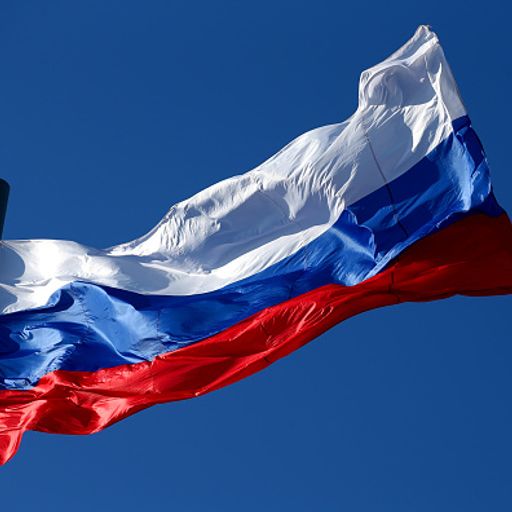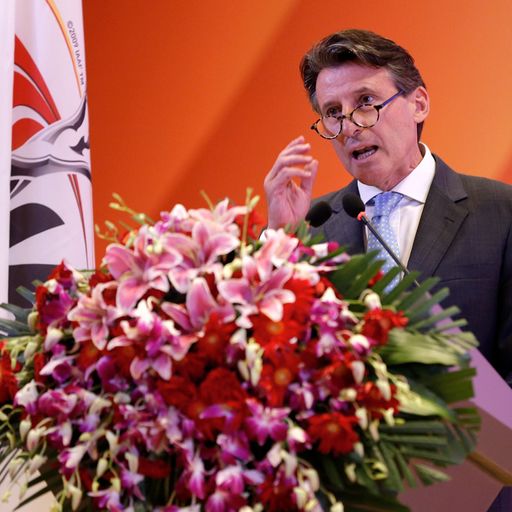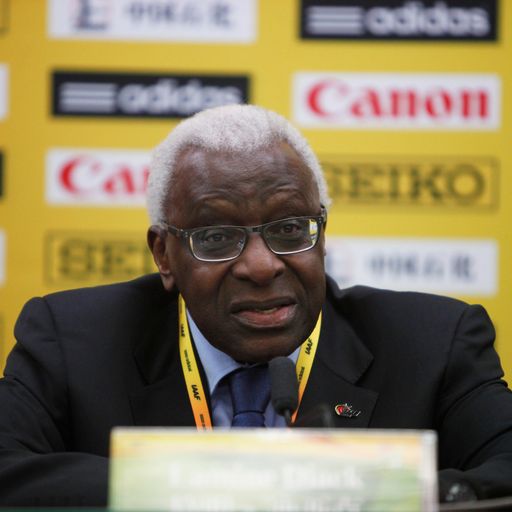WADA panel calls for Russia suspension and 10 lifetime bans from athletics
Tuesday 10 November 2015 08:03, UK
A World Anti-Doping Agency commission has recommended Russia be suspended from international athletics amid accusations of doping, cover-ups and extortion.
That means the Russians could be suspended from next summer's Olympic Games in Rio and future world and European championships.
An independent three-man panel headed by former WADA president Dick Pound said five athletes and five coaches should be given lifetime bans.
They include 2012 Olympic gold and bronze-medal winners Mariya Savinova-Farnosova and Ekaterina Poistogova.
Along with fellow commission members Richard McLaren and Gunter Younger, Pound produced a report more than 300 pages long into their findings in an investigation into allegations of Russian misconduct.
Summing up, he acknowledged unlike corruption claims in other sports such as the current scandal gripping FIFA, the Russians' actions actually affected results on the field of play.
In the report, the commission said the London Olympics were "more or less sabotaged" by allowing Russian athletes to compete when they should have been suspended for doping violations.
It claims number of Russian athletes suspected of doping could have been prevented from competing there had it not been for "the collective and inexplicable laissez-faire policy" adopted by the IAAF and the Russian athletics federation.
WADA also says Russian sports minister Vitaly Mutko issued direct orders to "manipulate particular samples."
Mutko, who is also a FIFA executive committee member and leads the 2018 World Cup organising committee, was interviewed by the WADA panel at the Baur au Lac hotel in Zurich on September 22.
While its report largely focuses on doping in Russian athletics, it adds "there is no reason to believe that athletics is the only sport in Russia to have been affected."
The WADA reports says agents from Russia's intelligence service, the FSB, infiltrated anti-doping work at the Sochi Olympics.
It also states "impartiality, judgment and integrity were compromised by the surveillance of the FSB within the laboratory." Staff at the Moscow lab believed their offices were bugged by the FSB.
The WADA report says Moscow testing laboratory director Grigory Rodchenko ordered 1,417 doping control samples be destroyed to deny evidence for the inquiry.
He is alleged to have "personally instructed and authorized" the destruction of evidence three days before a WADA audit team arrived in Moscow last December then claimed he had decided to "do some clean up to prepare for WADA's visit."
Rodchenkov, the report notes, "remained obstructive" throughout the investigation and refused to be recorded.
The report also suspects Russia has been using an obscure laboratory on the outskirts of Moscow to help cover up widespread doping, possibly by pre-screening athletes' doping samples and ditching those that tested positive.
It says whistleblowers and confidential witnesses "corroborated that this second laboratory is involved in the destruction and the cover-up of what would otherwise be positive doping tests."
It also says the "Laboratory of the Moscow Committee of Sport for Identification for Prohibited Substances in Athlete Samples" is controlled by the Moscow city government and operates in an industrial zone about six miles from the city centre.
Furthermore, it claims the Russian anti-doping agency and Russian athletics federation must know about the lab, stating "it is not credible to believe" that they didn't.
Pound said he wants to see better ways for whistleblowers to come forward without feeling the risk of retribution and said the World Anti-Doping Agency should find ways to make it easier for truth-tellers to speak out.
The Canadian also highlighted whistleblowers have previously been reluctant to come forward but insists the report is proof that there can be results from speaking out and stressed the extensive report is just the tip of the iceberg.







